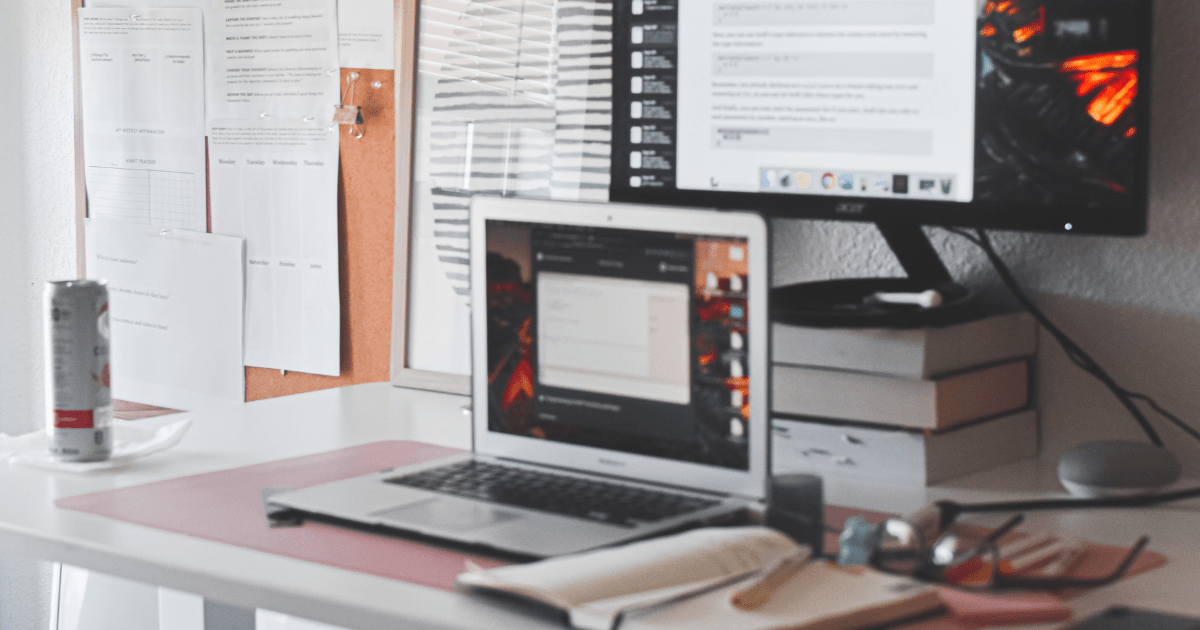How to Cope with Excessive Screen Times in a Virtual Learning Setting
 Written by: Grace Truek, 4th Year Medical Sciences
Written by: Grace Truek, 4th Year Medical Sciences
Photo by: Hana keinan on Unsplash
We have now entered our second semester of Virtual School and I will definitely admit, it is beginning to take a toll on me physically, mentally, and emotionally. This new way of learning has made me appreciate so many things that I may have taken for granted before. I miss walking to class every morning, grabbing a coffee in between my classes, and sitting in a lecture hall surrounded by my peers. Now, my days are consumed with Zoom lectures, textbook readings, typing out notes, and reading articles — all on my computer. According to Apple, my screen time ranges from 5–7 hours weekly, but I’m pretty sure it might be even higher than that.
There are a few tips that I have learned and habits that I have acquired throughout this year to help cope with all the time spent on screens and to decrease the amount of time I spend sitting. Here are a few tips to try:
1. Brightness Control Software
I started to notice that the bright white/blue colour of my laptop screen was pretty harsh on my eyes. I was recommended by a family member to download a brightness control software like “Flux” which adjusts your screen brightness and tone to mimic natural changes in light throughout the day. I have definitely noticed a difference in my eye strain and fatigue ever since using Flux. Whenever I turn off the application, I notice how bright the screen gets, and I much prefer it when it is adjusted by the app to a softer tone.
2. Blue Light Glasses
Blue light glasses are designed to filter out the potentially harmful blue light that is emitted from technology screens (Caporuscio, 2020). Currently, evidence supporting the use of blue light glasses is limited but nonetheless, they are still very popular, and many individuals have positive reviews of them. I recently just got a pair myself, and although I don’t notice an immediate difference, I am hoping that over time it may at least reduce some blue-light exposure. If you are looking into getting a pair, I recommend checking out Amazon, which has some really affordable ones. You could also talk to your Optometrist, who may be able to add a blue-light filter into your next prescription glasses.
3. Go See an Optometrist!
I have never been someone who has needed glasses and I’ve had almost 20/20 vision my entire life. Even though my vision seems almost perfect, recently, my optometrist prescribed me some reading glasses to use when I am on the computer. You would be surprised—even the slightest prescription makes a huge difference and when I don’t use my glasses, I can feel my eyes starting to strain almost right away. This is hands-down the best thing that I have done to help reduce physical strain caused by excessive computer use. So even if you think you have perfect vision, I highly recommend seeing your optometrist for a yearly check-up. Note that $70 of an eye exam and $100 of prescription glasses are covered through Western’s Health Benefits every two years.
4. Print Something If You Can
I definitely try to be as eco-friendly and as cost-effective as possible, but sometimes when I know I will be looking at one specific document or article over and over again, I will print it out. So instead of staring at the article on a screen for hours, I can close my laptop and read the hard copy version, the traditional way.
5. Get Your Body Moving
I know this one seems obvious, but it makes such a big difference. I try to make it a goal to at least stand up from my chair once every hour. When I am feeling extra sluggish, I will try to go on a quick walk around my block or try out a Youtube HIIT Workout (High-Intensity Interval Training).
6. Have At Least One Technology-Free Night a Week
This is something that I have only recently started after realizing just how much I am on my phone or computer. My New Year’s Resolution for this year is to have at least one night a week where I put my phone away at least 30 minutes before bed. I can take this time to read a book, write in my journal or listen to a podcast or music. So far, I have been keeping up with this goal and my technology-free nights are surprisingly very refreshing.
Published on

